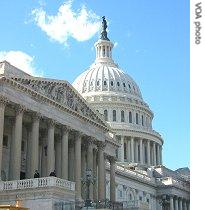2007年VOA标准英语-US House Approves Homeland Security Bill(在线收听)
By Deborah Tate
Capitol Hill
09 January 2007
Democratic leaders in the House chose national security as their top priority to begin their first 100 hours of action promised by Speaker Nancy Pelosi.

US Capitol, Washington DC
Half the 9/11 commission recommendations have been implemented, while the rest became bogged down in partisan wrangling in last year's Republican-led Congress.
One of the most ambitious proposals in the House legislation is a measure requiring the Transportation Security Administration (TSA) to screen all air cargo.
Congressman Bennie Thompson, a Mississippi Democrat, is chairman of the House Homeland Security Committee:
"This bill requires that TSA create a system of inspections to ensure that 100 percent of the cargo shipped on passenger planes is screened within three years," he said.
The legislation would increase port security, take steps to prevent nuclear material from falling into the hands of terrorists, provide money to improve emergency workers' communications equipment, and distribute more federal aid to states based on risk instead of population. It would also expand diplomacy by means of increased U.S. government broadcasts, economic and trade incentives, and exchange programs.
A number of Republicans expressed their opposition to certain provisions of the bill, including the requirement that all air cargo be screened - a proposal they argued that is unworkable and could shut down commerce and cost billions of dollars.
Congressman Harold Rogers is a Kentucky Republican.
"The ideas and proposals contained within this bill are overly costly and draconian, even," he said. "It is an effort by the new Democratic majority to look aggressive on homeland security. This bill will waste billions and possibly harm homeland security by gumming up progress already under way."
Other Republicans criticized the Democratic majority for limiting debate on the measure.
At a hearing across the Capitol, the chairman of the Senate Homeland Security and Governmental Affairs Committee, (Independent-Democrat) Senator Joe Lieberman of Connecticut, said he hopes the Senate would do its part to enact the 9/11 recommendations in the coming weeks.
"My hope is that in the next few weeks, by the end of the month, we will report out a piece of legislation that will take steps forward to adapt some of the unadapted, unimplemented, inadequately implemented parts of the 9/11 commission report," said Mr. Leiberman.
But the fate of the legislation in the Senate, where Democrats hold a two-seat majority, remains unclear.
Senate Republicans are opposed to a number of recommendations in the 9/11 Commission report. Senator Susan Collins is the top Republican on the Homeland Security and Governmental Affairs Committee:
"Not every single recommendation should be enacted," she said. "For example, the commission recommended that the Department of Defense [DOD] rather than the CIA [Central Intelligence Agency] be the lead agency for directing and executing paramilitary operations. The DOD, the CIA and many experts opposed that recommendation, and [the last Republican-led] Congress did not adopt it. I think some of the members of the 9/11 commission would agree that perhaps we made the right decision in that area."
Among those testifying before the committee were several members of the 9/11 commission, including former Congressman Timothy Roemer, who underscored the importance of the commission's recommendations on expanding U.S. diplomacy in the Arab world.
The war on terrorism, he said, is also a war of ideas and a war for hearts and minds. It is a war, he continued, that the United States must win.
"The time period for radicalized terrorists between alienation, radicalization and detonation is shrinking," he said. "More and more young people may be signing up for al-Qaida. The United States needs to have a compelling message to counter that trend."
Also testifying at the hearing was New York City Mayor Michael Bloomberg, who criticized the way federal anti-terrorism funds are distributed. He said his city had been shortchanged compared with other cities.
"I think it is fair to say that the administration and Congress share the blame for the politicalization of homeland security funding," he noted. "For the sake of New York City, and for the sake of our nation, I hope you stop writing politically derived formulas into homeland security bills. Instead, you should give the Department of Homeland Security complete flexibility to allocate 100 percent of homeland security grants according to risk, threat and return on investment."
The co-chairman of the 9/11 Commission, former Congressman Lee Hamilton, urged the Senate to approve the rest of his panel's recommendations.
The Democratic-led U.S. House of Representatives has approved a package of security measures aimed at preventing the kind of terrorist attacks that occurred on the United States on September 11, 2001. The vote was 299 to 128. The proposals are among those recommended by the 9-11 commission three years ago but never implemented, as VOA's Deborah Tate reports from Capitol Hill.